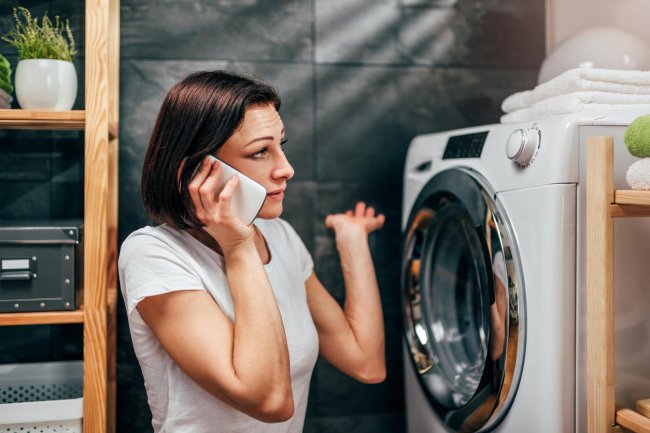

We may earn revenue from the products available on this page and participate in affiliate programs. Learn More ›
Q: I’m house-hunting for the first time, and I’ve noticed that some listings note that they include a home warranty. Is this a scam, or is it some kind of insurance policy? What is a home warranty, and what does a home warranty cover?
A: This is a great question, because the concept of a home warranty is often misunderstood. It’s neither a scam nor an insurance policy, and it can be a great component of a home purchase or a separate purchase as the home ages. Oftentimes, one of a home buyer’s worst fears is that they’ll sink most of their money into the purchase of the home, initial furnishings, and renovations with a set plan to afford the mortgage, insurance, and small repairs—and then a major system will unexpectedly fail, causing them additional expense and debt that they can’t afford. A home warranty is essentially a safeguard against the full weight of that financial burden. It’s a service contract that covers maintenance and repair of major home systems—exactly which ones should be specified in the contract—for a set amount of time. If there’s a problem or failure in one of the specified systems, the new owner won’t bear the full brunt of the repair or replacement cost. As you noted, sometimes sellers will include a home warranty as part of the sale. This may entice a buyer to overlook an older HVAC system or plumbing fixtures that aren’t updated, but a home warranty can also be purchased by new homeowners to protect their investment while they save for upgrades.
Interested in getting a home warranty? American Home Shield is a lead provider in home warranties and covers up to 23 appliances and systems in your home, meaning that you can stay within your budget when it comes to costly repairs.
A home warranty is a service contract that helps cover the cost of maintaining some house systems and appliances for a certain length of time. This can include plumbing, electrical, HVAC, well pumps, or even spa parts—but to know exactly what your home warranty covers, be sure to read the fine print.

The best home warranty companies can provide peace of mind for home buyers (and sellers, who can move on to their next home without having to worry about a system failure shortly after they’ve moved out and leaving it for the new homeowners to bear). But buyers need to be cautious and really read the documentation that accompanies the warranty. Policies will be specific: They will indicate which systems, appliances, and other parts of the home are covered, and if an item or system isn’t on the list, it is specifically excluded. Some buyers mistakenly assume that because it’s a home warranty, it covers the entire home, which is not the case.
Another mistake is assuming that coverage of the repairs or replacements will be complete and free, which is also usually incorrect, as there is a service fee or deductible, and some limits. Home warranties are great tools, but it’s important that homeowners read them carefully and ask lots of questions to make sure they fully understand how they work.
Choice Home Warranty can help you protect your home with a truly customized coverage plan that has everything you need and nothing you don’t. With over 4,000,000 service requests under their belt, your home is in good hands. See what Choice Home Warranty has to offer.
Home warranties are often included with the sale of a home, but a home warranty can be beneficial to existing homeowners as well.
Home warranties are most often discussed in the midst of a home sale. Sometimes a seller will purchase a warranty to entice potential buyers. According to Jessica Fields, chief sales officer at Frontdoor, Inc., which owns American Home Shield, this is because “home service plan coverage brings added value to listings, reassuring potential buyers that they won’t have to worry about covered repair or replacement expenses during the contract term, subject to contract limitations and exclusions.” Other times buyers will purchase a warranty after they close on the home to protect their new investment. They may not know what condition the home’s plumbing or HVAC are in, or have little left in savings for repairs, so having a home warranty offers peace of mind should anything fail.
While it is less common, homeowners can also purchase a home warranty even if they are not in the process of buying or selling. Fields explains, “Home service plans are suitable for any type of customer, due to the wide range of options for customization and add-on coverage. They may be an especially wise decision for homeowners on a set budget, owners of older homes, or recent home buyers.” As a home ages and its systems and appliances become less reliable, it makes sense for homeowners to consider whether the cost of buying a home warranty is worth it when contrasted with the risk of an expensive system failure.
A home warranty is not the same as homeowners insurance, but the two can work together to provide comprehensive coverage for homeowners.
At first glance, it may be difficult to see the difference between a home warranty vs. home insurance. The promise of covered repairs makes home warranties sound like a form of home insurance (and they are sometimes referred to as “appliance insurance” or “home warranty insurance”), but they are not the same as or a replacement for homeowners insurance. A home warranty is a contract intended to cover maintenance, service, and failure as a result of normal use, and it can be a great supplement to homeowners insurance. Fields explains it this way: “An easy way to differentiate a home service plan from insurance is that homeowners insurance protects against things that might happen, like natural disasters. Home service plans protect against things that will happen, like oven and AC breakdowns due to normal wear and tear. Unlike warranties, insurance can cover theft, loss or damage, and general liability that can arise when a person is injured while on your property.”
Traditionally, insurance is designed to cover damage to an entire property resulting from fire, weather, burglary or vandalism, and other unexpected events. Failures of home systems and appliances are not covered as they are typically the inevitable result of normal use. Even when damages to home systems are covered by insurance, deductibles are often larger than the cost of the repair, so they won’t help. “A homeowners insurance policy is typically required, and the majority of lenders will ask you to buy one when applying for a mortgage loan,” Fields says. “The best way to protect your home from the cost of unexpected issues and inevitable repairs is with a combination of a home insurance policy and a home service plan.”

The contract specifically states which systems and appliances are “under warranty.”
Home warranty coverage can vary greatly depending on the policy. When an issue arises that may be covered by a home warranty, the first step for the homeowner is to carefully reread their contract. Homeowners will want to check to be sure that the appliance or system is covered by the warranty, and then read the conditions that apply. Certain types of damage, failure, or breakage may not be covered. According to Fields, “Common issues covered by home service plans include kitchen appliances, washers and dryers, HVAC, electrical, and plumbing systems.” If the chosen warranty plan does not include some features of the home like a pool, spa, or specialty appliance, these can typically be added. On the other hand, some homeowners opt for home warranty plans that only cover a single system or appliance.
A system or appliance’s maintenance history may affect whether or not the cost of repair is covered by the home warranty.
The timing and treatment of damages and failures can affect coverage, and one of the worst money mistakes homeowners can make is skipping regular maintenance on their home systems and appliances. Pre-existing problems are often not covered by a home warranty (though some do offer this coverage), so if the previous homeowner has had the same problem on the washer repaired multiple times, that same repair won’t be covered by the new warranty. There are many ways to accidentally invalidate a home warranty. For example, if a malfunction causes the inside of the freezer to turn into a block of ice, the homeowner can likely try to melt the ice without breaking the contract. If, however, they order a new condensing coil and try to repair the freezer themselves, home warranty companies can declare the warranty invalid. Similarly, the homeowner may be asked to prove that the system or appliance was installed or serviced by a professional to receive coverage: If the previous homeowner installed a new HVAC system by themselves and it fails, the warranty company can deny coverage because the homeowner was not a qualified installer. This is one of the most common ways to void a warranty.
Interested in getting a home warranty? American Home Shield is a lead provider in home warranties and covers up to 23 appliances and systems in your home, meaning that you can stay within your budget when it comes to costly repairs.
Finally, in order for a system or appliance to be covered under a home warranty, a homeowner must be able to demonstrate that proper maintenance has been carried out in a timely and appropriate fashion. Most home warranty policies include what is called an “improper maintenance clause.” If a system has not been regularly serviced leading up to a claim being filed, or a repair was attempted by someone who is not a qualified professional, the warranty company could deny the claim. A warranty may not be worthwhile if the previous homeowner hasn’t kept up on the maintenance, so if the last service date on the furnace was 10 years ago, the warranty may not cover it if it stops working, even if it’s listed in the contract.
The policyholder typically pays a service fee for any repairs in addition to the annual fee for the home warranty policy.
On average, a home warranty costs about $600 per year, but that cost can range between $264 and $1,425. When a homeowner calls for service on a covered item, the vast majority of the cost (up to any stated limits) will be covered by the home warranty—but not all. While some warranties carry a deductible, most home warranty calls incur a small service fee of $75 to $125, depending on the item being serviced and the terms of the contract.
While some home warranty companies allow the homeowner to choose their own contractor, others will require them to use a company-approved service provider instead.
A home warranty company may only cover repairs that are carried out by an approved contractor. While some homeowners may appreciate not having to do the work of researching which company to hire, others may want the freedom to choose who will be working on their home. If a homeowner has a strong preference for choosing their own contractor, they will want to ask the warranty company for details about this aspect of the policy while shopping for coverage.
Not everyone needs a home warranty policy, but the benefits of getting one often outweigh the drawbacks.
Some homeowners may wonder, “Do I need a home warranty?” If the home is new and the maintenance has been consistent, they probably don’t have to worry about imminent system failures, and some experts recommend putting money into an emergency fund to pay for unexpected repairs instead of investing in a home warranty. That said, the peace of mind that a warranty offers, combined with a cost that is relatively low compared to what the repair and replacement would run without the warranty, can make it worthwhile even in a newer home—especially because a homeowner will be able to present all the maintenance documents. For an older home, a warranty is especially useful during the first 1 to 2 years of homeownership, before the new owner has had a chance to build up an emergency savings fund. Similarly, if the home is aging, it may be a good idea for the owner to purchase a home warranty while saving to replace a system that is nearing the end of its lifespan. Knowing the warranty is in place can take some of the panic and sting out of the morning a homeowner wakes up and discovers that the water heater has failed and flooded the basement, or when the furnace won’t ignite on the first cold morning of the winter.
